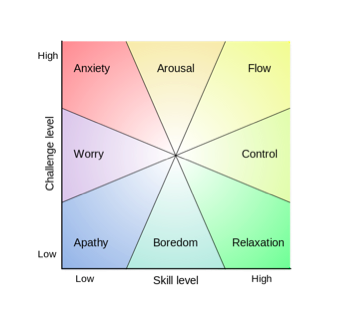What Is This Thing Called “Flow?”


Can you recall a time when you were so immersed in a pleasurable activity that you lost all track of time? When you were so happy with what you were doing that you felt as though you could do it forever?
The esteemed Hungarian psychologist, Mihály Csíkszentmihályi, has put a name to this rarefied feeling; he refers to it as “flow.” Also characterized as “a highly focused mental state,” flow is a rare and desirable condition that occurs when an individual is at his happiest, and is when the most remarkable creative innovations occur.
Csíkszentmihályi (b. 1934) has spent his career studying happiness and creativity. He found that a person’s skill level must be perfectly balanced with his challenge level, in order to reach the state of flow. In other words, the task at hand must be just a bit more challenging than is easy for the person to complete. Too hard, and anxiety levels rise. Too easy, and the person becomes apathetic and bored (see the chart below).

Understanding the concept of flow is essential to understanding motivation, especially in our children. If we agree that children are happiest and most motivated when their intellectual challenge level is set just slightly above their current skill level, then we’ve cracked the code that illuminates how to teach them.
Motivation can be internal or external. Our children can learn because we ask them to, or because they want to. Providing opportunities to achieve flow while learning is essential to linking education with internal motivation, which then leads to a wonderful positive feedback loop. The child enjoys learning so much, she is motivated to learn more, all on her own. She is also inoculated against frustration; rather, she understands that it is only when she is forced to work harder that the best rewards appear. Csíkszentmihályi found that intrinsic motivation transforms challenging situations into positive experiences. Understanding this connection allows us to give our children a powerful tool that will become the foundation of their entire educational career: the ability to meet challenges in a positive manner.
And how can we teach this skill to our children? When they are young, offering them opportunities to play in situations that challenge their abilities provides an excellent start. Puzzles and building blocks give very young children a chance to practice their solving skills and learn to deal with minor difficulties (like towers falling down). Older children may prefer solving riddles or logic puzzles, or creating codes or treasure hunts for others to solve. Inventing and designing fantasy worlds is also a popular source of flow. The activities that provide flow are highly individualized – each child will have his own interests and pursuits that stimulate him.
The common denominators among all activities that kindle flow are:
- A balance between skill and challenge
- Clearly stated goals
- Continuous feedback
- An opportunity for concentrated focus
When a child finds a chance to reach for a well-defined goal, which is just a bit hard to achieve, and she is receiving regular feedback as to her progress, in an atmosphere where she can concentrate fully on her object, she is very likely to find that state of flow.
As a parent, you are very likely to have come across your child immersed in a beloved game, to the point where she can’t hear you when you speak to her, and is reluctant to be dragged back into the present. Collect information about moments like this – what ties them together? In this way, you can determine what sparks your child’s moments of flow, and begin to set up opportunities for her to find it more often. Enjoy the process!
Recent Articles
-
Playful Primer 10 Must-Have Toys for Your Next Backyard BBQ
Summer is just around the corner and we're ready for it! From backyard BBQs to neighborhood park outings, we've discovered...
read more -
Playful Primer Tips & Toys to Support Group Play Experiences
Catching a glimpse of children happily engaged in pretend play is like witnessing pure magic. Ever wonder how closely you...
read more -
Playful Primer 5 Ways to Strengthen the Bond Between Siblings
“I’ll take care of the bike. You take care of each other.” This is what I said to my children...
read more
